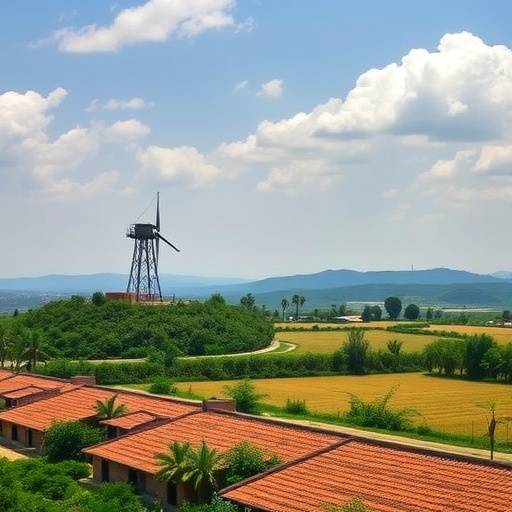Economic Development and Environmental Sustainability in Sub-Saharan Africa: A Complex Interplay
In recent years, policymakers and scholars alike have increasingly recognized the intricate relationship between economic development and environmental sustainability, particularly in the unique context of Sub-Saharan Africa. As the region grapples with rapid urbanization, significant population growth, and escalating climate change impacts, understanding how to navigate this complex interplay has become paramount. The need for sustainable development strategies that balance economic growth with environmental preservation is urgent, especially as Sub-Saharan Africa continues to experience both opportunities and challenges in its development journey.
The economic landscape of Sub-Saharan Africa is diverse, characterized by a mosaic of national economies ranging from resource-rich nations to those reliant on agriculture. This diversity not only shapes the economic policies adopted by various countries but also presents substantial challenges in fostering sustainable practices. The reliance on natural resources for economic development raises critical questions about the environmental consequences of such growth. As the region seeks to enhance its economic standing, the potential for overexploitation of natural resources looms large, threatening the delicate ecological balance that sustains local communities.
One of the defining features of Sub-Saharan Africa’s development narrative is the role of agriculture, which employs a significant portion of the population. While agricultural expansion has the potential to drive economic growth, it also poses significant environmental risks. Land degradation, deforestation, and loss of biodiversity are prominent issues that have arisen due to unsustainable farming practices. These environmental challenges not only impact food security but also undermine the very foundation upon which economic growth is built. Thus, addressing agricultural sustainability is critical for long-term development in the region.
Moreover, the energy sector in Sub-Saharan Africa presents a compelling case of conflicting priorities. On one hand, there is an urgent need for energy access to drive industrialization and improve living standards. On the other hand, the dependence on fossil fuels could exacerbate environmental degradation and climate change. Transitioning to renewable energy sources offers a viable pathway to reconcile these competing demands, yet the investments and infrastructural changes required for such a transition pose significant challenges. The lack of financial resources, technology gaps, and policy frameworks hinder the region’s ability to harness renewable energy.
Urbanization is another transformative force shaping the economic and environmental landscapes of Sub-Saharan Africa. The phenomenon of urban migration underscores the demand for robust economic opportunities and social services. Rapidly growing cities require sustainable urban planning strategies that integrate environmental considerations into development frameworks. Failure to do so risks creating urban areas that are not only economically vibrant but also environmentally degraded, suffering from pollution, inadequate waste management, and insufficient green spaces. Addressing these urban challenges through integrated development approaches is essential for achieving sustainable growth.
The region’s socio-economic inequalities further complicate the pursuit of sustainable development. Disparities between urban and rural areas, as well as among different demographic groups, can lead to tensions that hinder collaborative efforts towards sustainability. A focus on inclusive economic development is vital in this context, ensuring that the benefits of growth reach marginalized communities and empower them to participate in sustainability initiatives. Creating opportunities for all can foster a sense of ownership over local resources and promote responsible environmental stewardship.
Furthermore, climate change presents an existential threat that exacerbates existing vulnerabilities in Sub-Saharan Africa. Rising temperatures, changing precipitation patterns, and more frequent extreme weather events challenge traditional livelihoods and force communities to adapt. Addressing climate adaptation and mitigation must be incorporated into the economic development strategies of the region. This requires a concerted effort from governments, civil society, and international organizations to develop adaptive practices that not only protect the environment but also enhance resilience against climate impacts.
International cooperation plays a critical role in advancing the sustainable development agenda in Sub-Saharan Africa. Collaborative efforts that share knowledge, technology, and resources can accelerate progress towards achieving sustainability goals. Regional partnerships can promote best practices and foster innovation in areas such as clean technology, sustainable agriculture, and climate resilience. Global climate financing mechanisms can also support investments in sustainable infrastructure projects that align economic development with environmental protection.
In conclusion, the nuances of economic development and environmental sustainability in Sub-Saharan Africa reflect a complex interplay of challenges and opportunities. The region stands at a crossroads where the choices made today will significantly impact its future trajectory. Embracing sustainable development frameworks that prioritize environmental preservation while stimulating economic growth is not merely an option but a necessity. Policymakers must adopt a holistic approach that integrates economic, social, and environmental dimensions to create a resilient and sustainable future for all.
As the global community looks toward addressing pressing development challenges, the lessons learned from Sub-Saharan Africa can provide valuable insights. The region’s experience underscores the importance of balancing growth with sustainability, acknowledging that economic aspirations cannot come at the expense of the environment. Ultimately, fostering a sustainable development paradigm will pave the way for Sub-Saharan Africa to thrive in an increasingly interconnected world.
Subject of Research: Economic Development and Environmental Sustainability
Article Title: Nuances of economic development and environmental sustainability in Sub-Saharan Africa
Article References:
Damoah, B., Boglo, R. Nuances of economic development and environmental sustainability in Sub-Saharan Africa.
Discov Sustain 6, 999 (2025). https://doi.org/10.1007/s43621-025-01796-4
Image Credits: AI Generated
DOI:
Keywords: Economic Development, Environmental Sustainability, Sub-Saharan Africa, Agriculture, Urbanization, Climate Change, Renewable Energy, Sustainable Development.




